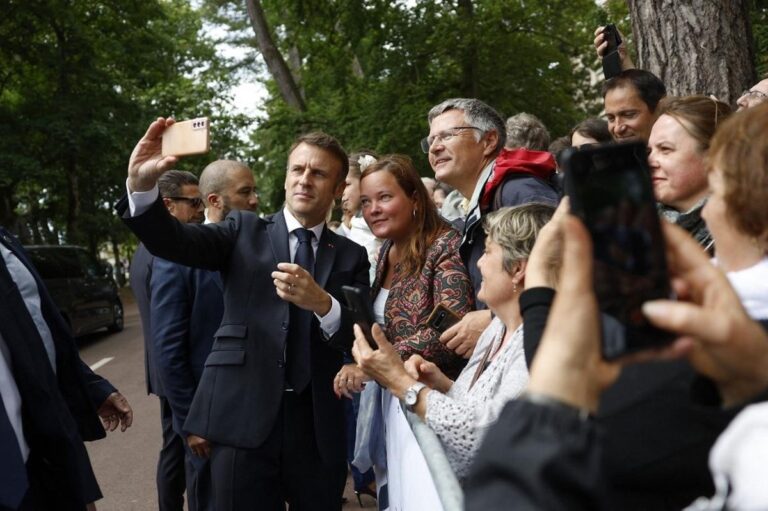President Emmanuel Macron was due to launch an effort on July 8 to steer France out of its most severe political instability in decades after elections saw the left defeat the far right, with neither group winning an absolute majority.
President Macron’s parliamentary elections, held three years ahead of schedule in an attempt to reshape the political world, have left France without a clear path to forming a new government just three weeks before the Paris Olympics.
Prime Minister Gabriel Attal is due to submit his resignation to President Macron on July 8 but has also made clear he is prepared to stay on as caretaker prime minister as weeks of political uncertainty loom.
The left has emerged as the largest force in the new parliament but has yet to agree on who it wants as the new prime minister.
This unprecedented situation is taking shape just as Macron is due to spend much of this week abroad attending a NATO summit in Washington.
“Is this the biggest crisis of the Fifth Republic, which began in 1958?” asked Gael Slimane, director of the Odoxa polling group.
“Emmanuel Macron had asked for clarity about the breakup, but now we are in total uncertainty. It’s a very thick fog.”
A divided parliament
The result was a major disappointment for Marine Le Pen, whose far-right Rally National (RN) party was set to have its largest ever presence in parliament after winning by a landslide in the first round of voting on June 30.

Macron’s centrist coalition will lose dozens of MPs but could hold up better than expected and come in second.
The left-wing New Popular Front (NFP), formed last month after President Macron called early elections, has brought together previously deeply divided parties such as the Socialists, the Greens, the Communists and the far-left Indomitable France (LFI) into one camp.
According to forecasts by major polling agencies, the NFP is expected to emerge as the largest party in the new National Assembly with 177-198 seats, Macron’s coalition will win 152-169 seats and the RN will win 135-145 seats.
That means no party will come close to the 289 seats needed for an absolute majority, and it remains unclear how a new government will be formed.
Macron has yet to speak publicly about the projections but has called for “caution and analysis of the results,” said the aide, who spoke on condition of anonymity.
LFI MP Clementine Autin called on the NFP coalition to meet on Monday to decide on a suitable candidate for prime minister.

In key individual battles, Le Pen’s sister Marie-Caroline was narrowly defeated in the parliamentary election, but former President François Hollande will return to the political frontline as a Socialist member of parliament.
“confusion”
The firebrand leftist Jean-Luc Mélenchon, leader of the LFI and the controversial head of the NFP coalition, demanded that a left-wing government be allowed to form.
Just a week ago, some opinion polls had suggested that Ms Le Pen’s 28-year-old deputy, Jordan Bardella, would become prime minister and the RN could win an absolute majority.
Instead, he expressed anger.
Bardella called the local election pact, made by the left and centre parties to avoid splitting the anti-RN vote, an “unholy alliance”.
He said the election had “put France in the pocket of Jean-Luc Mélenchon’s far-left forces.”
“The tide is rising. It was not full enough this time, but the tide continues to rise and as a result our victory has only been delayed,” declared Le Pen, who is seeking a fourth presidential election in 2027.
In the first round of voting, more than 200 strategic voting agreements were made between centre-right and left-wing candidates in an attempt to prevent the RN from winning an absolute majority.
It has been hailed as a revival of the anti-far-right Republican Front, first formed when Le Pen’s father, Jean-Marie, faced off against Jacques Chirac in the 2002 presidential runoff election.
The question now for France is whether this last-ditch alliance, led by Le Pen herself as she prepares to run for president in 2027 and pursued by a sizable RN faction still in parliament, can support a stable government.
Risk analysis firm Eurasia Group said there was “no clear ruling majority” in the new parliament.
“As long as the current administration continues to manage current operations, it may take weeks to resolve the mess.”
This is a premium article available only to our subscribers. To read over 250 premium articles every month,
You’ve reached your limit for free articles. Support quality journalism.
You’ve reached your limit for free articles. Support quality journalism.
You have read {{data.cm.views}} from {{data.cm.maxViews}} Free articles.
This is the last free article.

